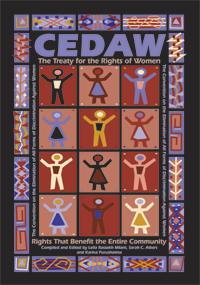CEDAW – the magna carta of equal rights for women celebrates its 30th anniversary on 18 December!
In 1979, the UN General Assembly adopted the Convention on the Elimination of All Forms of Discrimination Against Women (CEDAW), a milestone towards gender equality. For the first time civil and political rights as well as economic, social and cultural rights of women worldwide in all spheres of life are at the centre and should be protected.
CEDAW
What is CEDAW?
A brochure, elaborated by Austrian and international experts on women’s rights, describes the development and history of CEDAW, explains in detail procedural aspects as well as women’s rights as defined in CEDAW and shows the significance of Blog:
30 years CEDAW
The WIDE Network (Women in Development Europe) is running a blog as part of the WIDE CEDAW +30 campaign to celebrate the anniversary of Convention on the Elimination of All Forms of Discrimination against Women. The blog offers an overview of events and latest publications about CEDAW.
Link to the blog
polis aktuell – Women’s rights are Human Rights
This magazine for teachers gives an overview of CEDAW and contains also exercises for the classroom, tips for links and further background reading on the development of women’s rights in general. (available in German only)
The CEDAW Committee
The procedure
The United Nations Committee on the Elimination of Discrimination against Women (CEDAW) watches over the implementation of CEDAW in State parties. Austria ratified CEDAW in 1982 and is since then obligated to submit a national report describing the situation of women in Austria every four years. In addition national and international non-governmental organisations focused on human rights and women’s rights offer the committee valuable information via so called “shadow reports”. Based on the given information, the Committee then makes recommendations for the State party.
Sixth Austrian report to the Committee on the Elimination of Discrimination against Women (CEDAW), 2004
Comments of the Committee on the Elimination of Discrimination against Women for Austria, 2007
Austrian Shadow Report, Women’s NGO Platform, Vienna, 2006
See attachment below
Optional Protocol to the Convention on the Elimination of all Forms of Discrimination against Women
The Optional Protocol took effect in Austria in 2000. This includes the option to submit an individual complaint (the Communications Procedure) to the CEDAW Committee, when women or groups of women felt that their rights as defined in the Convention were violated. One requirement for the complaint is that all domestic remedies must have been exhausted before. Additionally the Optional Protocol includes an inquiry procedure, which can be initiated by the committee.
Individual complaints
In the meantime the Committee dealt with ten complaints, two of these concerned Austria. The complaints concerning Austria have been submitted by the Vienna Intervention Centre against Domestic Violence and the Association for Women’s Access to Justice. Both communications concern cases of male violence against women in relationships, in both cases women have been assassinated by their husbands in 2002 and 2003.
Violence against Women
The Austrian online newspaper diestandard.at featured short videos on different forms of violence against women during the”16 Days of Activism against Gender Violence”. Several Austrian NGOs such as the Austrian Women’s Shelter Network, CARE Austria, Frauensolidaritaet – Solidarity among Women, LEFOE – Counselling and Education of Migrant Women as well as the WIDE network contributed to the videos showing violence against women in all its patterns.
